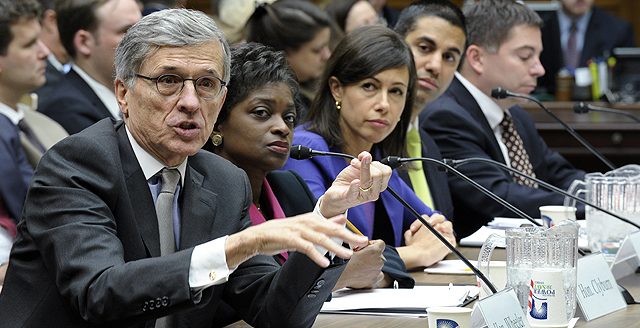Net neutrality would boost FCC’s budget by upping fees

UP AND UP: If net neutrality is adopted, the FCC stands to gain a huge amount of money in fee collection. With spending on some programs going up by 62 percent next year, according to FCC chairman Tom Wheeler, left, it’s anyone’s guess how much more the FCC will be collecting in additional fees once net neutrality is adopted.
By Yaël Ossowski | Watchdog.org
With a name like Federal Communications Commission, one would expect the nation’s premier regulator of the public airwaves to be a functioning government bureaucracy with access to the federal coffers.
But much like the Federal Reserve, which regulates monetary policy for the United States, the FCC actually is an independent agency, connected to the executive and legislative branches only by presidential appointment and Senate confirmation of commissioners.
It receives its money solely from usage fees collected from communications firms, which pass that cost on to consumers.
That means it’s no more federal than Federal Express.
With that distinction in mind, it becomes an important fact for considering how much it would gain in the net neutrality debate swirling around the nation’s capital. That means that any fee hike, instead of hitting taxpayers, will hit Internet users. And since 87 percent of Americans use the Internet, according to the Pew Research Center, that means everyone can expect to pay a bit more for services if net neutrality is adopted.
According to its latest budget, the FCC is set to receive $375 million in fees. And that’s without any further regulation of the Internet or re-definition of wireless providers as public utilities — exactly what President Obama urged in his latest weekly address.
The view that the FCC will collect much more for its programs, such as the Universal Service Fund, which provides bandwidth access to populations who otherwise wouldn’t receive it, was confirmed recently in a speech by a FCC commissioner.
“I am very confident that, based on my conversations, the commission intends to go on a spending spree with regards to USF (Universal Service Fund); in particular, on its E-Rate and Lifeline programs,” FCC Commissioner Michael O’Rielly said last week at a policy seminar hosted by the Free Station F0undation. “Those programs are expected to be expanded by many billions of dollars and shatter the USF collection and spending levels of this year.”
With spending on these programs going up by 62 percent next year, according to FCC chairman Tom Wheeler, it’s anyone’s guess how much more the FCC will be collecting in additional fees once net neutrality is adopted.
International wireless firms are understandably resistant to this change.
“Imposing antiquated common carrier regulation .. .on the vibrant mobile wireless ecosystem would be a gross overreaction that would ignore the bipartisan views of members of Congress and the FCC, would impose inappropriate regulation on a dynamic industry and would threaten mobile provider’s ability to invest and innovate, all to the detriment of consumers,” said Meredith Attwell Baker, president and CEO of CTIA Wireless Association, an international communications lobby, in a statement. “CTIA strongly opposes such an approach.”







